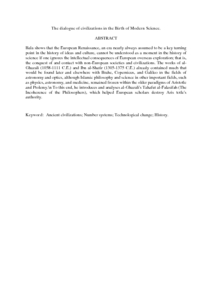Citation
Deuraseh, Nurdeng
(2008)
The dialogue of civilizations in the Birth of Modern Science.
Journal of World History, 19 (4).
pp. 552-556.
ISSN 1045-6007
Abstract
Bala shows that the European Renaissance, an era nearly always assumed to be a key turning point in the history of ideas and culture, cannot be understood as a moment in the history of science if one ignores the intellectual consequences of European overseas exploration; that is, the conquest of and contact with non-European societies and civilizations. The works of al-Ghazali (1058-1111 C.E.) and Ibn al-Shatir (1305-1375 C.E.) already contained much that would be found later and elsewhere with Brahe, Copernicus, and Galileo in the fields of astronomy and optics, although Islamic philosophy and science in other important fields, such as physics, astronomy, and medicine, remained frozen within the older paradigms of Aristotle and Ptolemy.\n To this end, he introduces and analyses al-Ghazali's Tahafut al-Falasifah (The Incoherence of the Philosophers), which helped European scholars destroy Aris totle's authority.
Download File
![[img]](http://psasir.upm.edu.my/17057/1.hassmallThumbnailVersion/The%20dialogue%20of%20civilizations%20in%20the%20Birth%20of%20Modern%20Science.pdf)  Preview |
|
PDF (Abstract)
The dialogue of civilizations in the Birth of Modern Science.pdf
Download (84kB)
| Preview
|
|
Additional Metadata
| Item Type: |
Article
|
| Subject: |
Science - History |
| Subject: |
Science - Philosophy |
| Subject: |
Science and civilization |
| Divisions: |
Faculty of Human Ecology |
| Publisher: |
University of Hawaii Press |
| Keywords: |
Ancient civilizations; Number systems; Technological change;
History.
|
| Depositing User: |
Emelda Mohd Hamid
|
| Date Deposited: |
18 Jun 2012 02:35 |
| Last Modified: |
22 Jul 2016 03:42 |
| URI: |
http://psasir.upm.edu.my/id/eprint/17057 |
| Statistic Details: |
View Download Statistic |
Actions (login required)
 |
View Item |

